So, since I haven't been blogging in a while, but I've read quite a bit in the past few weeks, I thought I'd start off with brief reviews of some of the books I've picked up recently.
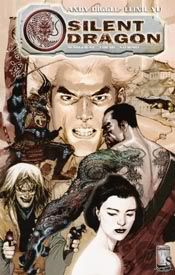 Silent Dragon
Silent DragonBy Andy Diggle and Leinil Francis Yu
Published by DC/Wildstorm; $19.99 US
Collects Silent Dragon #1 - #6
Silent Dragon is set in a futuristic Japan where mechanized samurai and ninja police the populace. The lead, Renjiro, serves a supposedly idealistic yakuza boss with dreams of "protecting" his countrymen from the government and re-instituting bushido as the nation's governing principle. Renjiro is falsely accused of betraying his master and submits to seppuku in order to protect the real traitor: his master's wife. Once resurrected in a cybernetic body by a government agency, Renjiro goes on a mission to get revenge on his former master, win back his true love, and slip free of the back-stabbing and elusive government agent who brought him back to life.
Silent Dragon is the only book reviewed here that's come out in the last couple of weeks, and I went into it completely blind. I hadn't read any of the single issues, seen past work from any of the creators involved, or any promo stuff for the series. My post-Lone-Wolf-and-Cub mad-on for samurai stuff is all that drew me to Silent Dragon, and it didn't steer me wrong. Yu's classical Japanese settings, like the yakuza boss' home in the beginning of the book, are just as stunning as his uber-mechanized samurai. I'd heard praise for Andy Diggle's work before, but never had the chance to experience it for myself, and now I know what all the fuss is about. Silent Dragon often feels like a faster-paced Sleeper, and makes me wonder if the mini might not have been somewhat less enjoyable if read issue-by-issue. Without giving too much away, the conclusion kicks you hard in the chest, and the nature of it is refreshing in the kind of tale that tends to hold the concept of the medieval Japanese warrior as a purer and more desirable alternative to modern life. While I love my seppuku and my katanna-slicin', I tend to doubt the samurai were any more or less heroic than their European counterparts, or that the ideals that put swords in their hands were necessarily any purer.
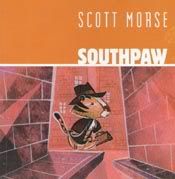 Southpaw
SouthpawBy Scott Morse
Published by AdHouse Books; $9.95 US
So, when I decided to broaden my horizons and start reading books that had less to do with superheroes and more to do with "etc.," I stopped by ADD’s Blog and started clicking madly on all the links he’s got to the companies that publish things like 300-page tomes of a Brazilian chick on a beach or love stories with anthropomorphic hippos . You know, silly stuff. Not the kind of serious literature you’d expect from Heroes for Hire or Blue Beetle (and I was a little surprised that some of those sites, like Ait-planetlar and Fantagraphics, are on my employer’s restricted list). At AdHouse’s site I saw a Scott Morse book called Southpaw about a tiger, apparently introduced in Project: Telstar, who fought robots. And it was by Scott Morse, whose work I’d reviewed just a little bit. And I thought hey! Robot-fightin’ tiger-man! I can get down with that! I can be all artistic and shit! Remembering that cool boxing scene in Ancient Joe, I figured I was in for a treat.
And I was, but it wasn’t what I expected. The story of Southpaw is told in single, uncolored panels on orange paper. Its protagonist is mute, and the story is a familiar one: the boxer who refuses to take a dive and flees from the criminals who would punish him for it. Except with robots. And a tiger.
I was disappointed with Southpaw at first and was pretty sure it would end up on my trade list at Sequential Swap. The story seemed short for its price tag, at first I found the orange paper a little abrasive, and there were a few pages - for example, one showing the twisted remains of a defeated robot - where I had trouble simply figuring out what was going on.
But I just couldn’t bring myself to let it go. Southpaw’s characters are few, but well-defined with minimal treatment. A scene towards the end - when the main character briefly reunites with his children - though only a handful of panels long with hardly any dialogue, was one of the most endearing and sad scenes I’ve ever read in a graphic novel. Without words, Morse created a loveable and tragic hero-on-the-run, and I honestly don’t think I’m a good enough reader yet to tell you how. I can say that rather than regretting the price tag, I’ve come to appreciate the brevity, because it means I can re-read it before any other grown-ups figure out I’m flipping through a funnybook about a robot-fightin’ tiger-man. It’s certainly my favorite of the graphic novels reviewed here, and I think I’ve found a creator whose work can act as a door to all those strange comics that have nothing to do with Hulk smashin’.
(not that there’s anything wrong with Hulk smashin’, he’s apparently the strongest one there is)
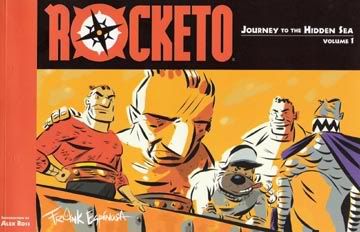
Rocketo: Journey to the Hidden Sea, Vol. 1
By Frank Espinosa and Marie Taylor
Published by Image; $19.99 US
Collects Rocketo #0 - #6
When I mentioned my “post-Lone-Wolf-and-Cub mad-on for samurai stuff” earlier, I don’t think I was completely accurate. Lone Wolf and Cub didn’t leave me hungry for samurai vengeance tales as much as epic adventure stories. Stories with the heroism and action of superhero comics; while blessed with the negligible story qualities most superhero stuff lack like forward-moving characterization, humanity, and narrative conclusions. I was hungry for Conan and ElfQuest and Age of Bronze. I was hungry for The Odyssey.
I never imagined Rocketo would be one of the books to fill that need. I remember when I saw the preview at Newsarama and thinking, “Oh, please make it to a trade, make it to a trade.” I remember breathing a sigh of relief when it was announced Image would save Rocketo from the death of Speakeasy. Still, I never thought Rocketo would be the book it is. Just judging by the art I guess, I figured its main character - with a shirt that looked like Aquaman’s and everything from the bridge of his nose to his chin looking like it was culled from Fred Flinstone - would be a finely rendered Flash Gordon parody. His willful companion Spiro had a face like Chubby Da Choona from Seaguy and the ninja-like Boaz looked like a pez dispenser from Hell. I guess I can’t blame myself for expecting the book to be a skillfull, yet silly action romp.
Rocketo Garrison is no parody, but a daydreaming hero scarred by war. Rocketo feels more like The Odyssey than any comic I’ve come across, and not just because the first chapter (from Rocketo #0) is a direct homage to part of the Greek hero’s adventures. Espinosa uses the post-apocalyptic setting to create a land of fantasy rather than the bleak wastelands, bursting with weighty social commentary, that you find in most post-apoc tales. The worldwide disaster opens the way for men like Rocketo and his ancestors to revel in the kind of adventure that fueled Odysseus’s soul. While there’s certainly humor in the book, the cartoon-y style doesn’t render its heroes any less serious nor its villains any less terrible. The style succeeds in giving the story an epic feel that I never thought possible with such a strong element of cartoon. I am far too dumb to adequately describe the book’s incredible art, I just know I’m chomping at the bit for those floppies to come out, so they can hurry up and release the second TPB.
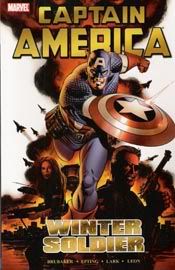 Captain America: Winter Soldier, Vol. 1
Captain America: Winter Soldier, Vol. 1By Ed Brubaker, Steve Epting, Michael Lark, John Paul Leon, and Tom Palmer
Published by Marvel; $16.99 US
Collects Captain America, Vol. 5, #1 - #7
If I were to ever find myself in Marvel’s Bullpen, Captain America would probably be the last character I’d want to handle. While I’m still on the fence as to whether or not there just aren’t any more interesting directions to take the decades-old superheroes of the Big Two, Captain America is particularly problematic. His identity as a leader has become such a defining characteristic that the prospect of reading his solo adventures just seems silly. I’m just so used to fight scenes with someone like Justice thinking “Wow, Cap is so brave! And smart! And handsome! I can’t believe I get to punch people alongside him!” And his morality is so set-in-stone that trying to introduce anything innovative in his characterization, no matter how negligible, is bound to piss a whole lot of people off. Hardcore wing-head fans liken Mark Gruenwald’s Cap run to a sacred text these days, but I remember the letters pages back in the day, and fans weren't writing love notes to the guy; particularly when Gruenwald had Cap blow away a guy with an uzi, and later when Cap temporarily gave up his title. I wouldn’t say fan-favorite dartboard targets like Austen and Bendis had it easy in comparison, but that’s only because the Internet was just a glimmer in Al Gore’s eye back when Gruenwald was scribing Cap.
I don’t know if it would be right to say Brubaker and Epting have worked magic with Captain America, but the fact that I intend to pick up a copy of Captain America: Winter Soldier, Vol. 2 proves its predecessor a success, simply because it’s the first time in a long while that I’ve given a damn about the character or the comic. I don’t think this is a result of Brubaker revealing anything new or insightful about Steve Rogers. I think Marvel has been at a loss as to what the hell to do with Cap for years. He’s a marquee-level character in name, but as far as buzz is concerned until now he’s been somewhere around Brother Voodoo and Man-Thing (unless you count the brief spike in Cap-chatter the release of Truth caused). Brubaker’s just applied a model he’s had success with in other books to one of Marvel's most stagnant characters, and because it’s a model Brubaker’s adept at molding, presto, people are actually buying the thing.
Which isn’t to say it isn’t good, solid espionage storytelling, because it is. It’s suspenseful and engaging, with great, mostly “silent,” action sequences by Steve Epting, and it leaves you wanting more. But it’s no Sleeper, and the only real innovation here is that one Cap rule that Brubaker shamelessly broke (and I won’t spoil it, even though I doubt there’s anyone left for whom it would be a spoiler).
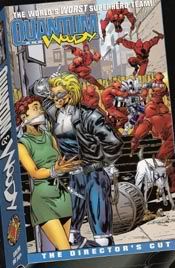 Quantum & Woody: The Director’s Cut
Quantum & Woody: The Director’s CutBy Christopher Priest and M.D. Bright
Published by Acclaim Comics; $7.95 US (Out of print, so you’re probably going to have to dish out more than the cover price)
Collects Quantum & Woody #1 - #4
I’ve been hunting for this goddamn trade for years. I heard about it when Priest’s Black Panther was in full-swing, and the descriptions from fans plus Priest’s skill on BP made it look too good to not pursue. I don’t think I’m exaggerating when I say that EVERY SINGLE TIME I’ve browsed through Sequential Swap’s trade list that I’ve clicked on the “Q,” saw almost nothing by Queen and Country collections, sighed and surfed onwards. Once it finally showed up, I jumped on it, and luckily I had just filled my own swap list with enough not-completely-bad books that the swapper was willing to give up the goods.
The bad news is that Quantum & Woody was worth the wait, meaning I'll be hunting down the other three trades, and at this rate my 2-year-old nephew will be a freshman in college before I see the things (along with the hardcover collection for Ultimates 2).
Quantum and Woody are really Eric Henderson and Woody Van Chelton respectively, a pair of childhood “friends” who are,
It’s funny, because I have to stop myself from writing something like “With Quantum & Woody, Priest lets loose with the Everett-Ross goofiness and Tarantino-esque time-shifting, that’s comparatively tame in Black Panther, with hilarious results!.” Which, you know, would be stupid since I keep forgetting Q & W actually came first. Though, I guess, considering Priest’s non-linear storytelling, that would be fitting.
So, with Quantum & Woody, Priest lets loose with the Everett-Ross goofiness and Tarantino-esque time-shifting, that’s comparatively tame in Black Panther, with hilarious results!!!!!
Quantum & Woody succeeds where so many other superhero parodies fail, I think, because Priest and Bright are able to walk a line that so many others plummet over. There’s a lot of superhero parody that’s way too parody and not enough superhero. It’s one of the reasons I could never get into Byrne’s She-Hulk or the JLI creative team’s recent take on Defenders. The stories fall too deeply into the goofiness and the result is humor that’s easy, formulaic, and predictable. Priest and Bright never forget that their heroes are heroes. Quantum looks genuinely cool spinning discs at foes or hopping flagpoles down the side of a building, his white cape billowing behind him in cool, Batman-y ways. There’s enough seriousness and genuine heroism to make the book more than just parody.
It’s freaking hilarious, the art is sweet, and goddammit, it’s out of print.
Okay, that’s enough for tonight.
This has actually been pretty cool: writing a bunch of short reviews rather than longer reviews, one-by-one. I might opt to do more of this from now on.
Though, you know, re-reading a lot of this stuff, I don’t know if I can call myself a reviewer. My stuff is more of a recording of impressions, I guess. Oh well. Whatever. I’m a ‘bloggin’, regardless.

No comments:
Post a Comment